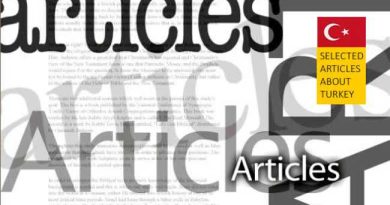Interview: What kind of image does Turkey have in the Arab world?
 The Republic of Turkey has taken a major part in the politics viewed in the Middle East and the Arab world for the last several years. Ak Parti government (AKP) has chosen to be a major player in the region which has in fact brought about the question “Is Turkey after bringing to life again the Ottoman Empire era?”.
The Republic of Turkey has taken a major part in the politics viewed in the Middle East and the Arab world for the last several years. Ak Parti government (AKP) has chosen to be a major player in the region which has in fact brought about the question “Is Turkey after bringing to life again the Ottoman Empire era?”.
In fact, PM Erdoğan has paid so many visits to countries in the Middle East and North Africa and displayes an attitude clearly showing any minor move in the region is to be followed carefully by Turkey to see if it is within the interests of this country. It is also a fact that the fast and strong economic development this country has displayed has been a major factor to contribute to this strong and challenging stance.
On the other hand what we call “the Arab Spring” has only enhanced this new status Turkey is determined to impose on the region and thus the PM and Mr. Davutoğlu the foreign minister have been both very active and quite involved as far as events we have lived through in the region, recently.
So far, we have painted a very positive and quite constructive picture as far as the benefits and position of Turkey in the region is concerned.
However when we look at the picture through the eyes of a true expert we may end up with a different story. Mr. KABOGLU a very prominent and respectable academist specialized in law has a very different opinion to share with us.
In the interview below you may be surprised to know Turkey after all the efforts spent in the region, has not been able to acquire what it has been heading for as far as its status in this part of the world is concerned.
23.10.2011
Editor
BUSINESS TURKEY TODAY
INTERVIEW
withProfessor Ibrahim Kaboğlu
Contradictory image of Turkey is confusing the Arab world
While Turkey’s political system is attractive to the Arab world, it has also been a contradictory image, says Professor İbrahim Kaboğlu, who visited Tunisia three times after the Jasmine Revolution. The inconsistency on what Ankara says abroad and what it does at home confuses the Arabs who are also wary of Turkey’s intentions in the region.
Professor İbrahim Kaboğlu (R) is scheduled to give courses on Turkey’s charter in Tunisia in the coming months. He has been invited to talk about Tunisia’s reform process at a French university next month.
Tunisians will go to the ballot box on Oct. 23 to elect a new National Constituent Assembly to prepare the country’s new charter just as a Turkish commission has been holding its first meeting to also write a new constitution. But while the former is displaying democratic maturity by electing an assembly to write its charter, Turkey’s method of creating a new charter might not lead to the desired outcome, a constitutional legal scholar has said.
“While Turkey calls for democracy in the Middle East, questions are being raised as to whether it meets the requirements of democratic governance. Arabs are aware of this inconsistency,” Professor İbrahim Kaboğlu told the Hürriyet Daily News in a recent interview, noting that Turks are sending out mixed signals to Tunisians with their recent move.
What are your observations about Tunisia?
I saw that Tunisians preferred to share their experience with us rather than the Europeans. The Venice Commission (of the Council of Europe) was officially welcomed but, with the exception of sending experts to train election officials, long-term institutional cooperation was not established. I believe this has to do with the colonial past. They have the tendency to think, “We just gone out of the hegemony of the Europeans recently. We don’t want a constitution that will carry the mark of Europeans. We made the Jasmine Revolution by ourselves, and we can make the constitution by ourselves.”
But there was a stark difference in the perception of Turkey between my first visit and the last one that coincided with Prime Minister Recep Tayyip Erdoğan’s visit to Tunisia. During my first visit, they felt Turkey’s support. During the last one, there was wariness.
Why?
On the one hand, Turkey is a country they sympathize with and follow carefully. But they are now questioning whether the secular system in Turkey is being eroded. I have been asked that question many times – even the head of the high authority for the Achievement of the Revolution’s Objectives, [Yadh] Ben Achour, raised this question openly during the opening of the university. They are wondering what kind of legacy this government will leave behind as far as the secular nature of the system. It’s like you have a friend who is envious of one of your positive characteristics but now wonders if you are about to lose that characteristic.
Meanwhile, the way in which the Turkish prime minister came to Tunisia as an “uninvited guest” in the framework of his tour in the Middle East has also created wariness.
What do you mean by the way the prime minister came to Tunisia?
The initial requests of the prime minister to visit Tunisia were turned down by the Tunisian authorities, who said, “Don’t come, we are a temporary government.” But he insisted on coming, and he sort of imposed his own rules. The Tunisians were struggling with their own problems, with the security forces and the army, and there was a huge influx of refugees from Libya. Then the Turkish prime minister came with a huge delegation, with his own bodyguards and specially trained dogs from Turkey to provide security despite the objection of the Tunisian side. Plus the Turkish demand to send posters of the prime minister ahead of the visit in order for them to be hung on the street – all of this seems to have created resentment. And the fact that it was within the framework of his tour of the Middle East, it led to questions as to whether Ottomanism was being revived and whether Turkey had some imperial inclinations about spreading its influence to the region in an effort to dominate it.
But when the prime minister called for a secular constitution, what kind of an effect did it have on Tunisia?
Actually, Muslim circles in Tunisia do not like the concept of secularism. In fact, they are trying to find a formula whereby they can manage to have a legal system that does not rely on religion without, however, using the concept of secularism in the constitution. Meanwhile, in the eyes of the secular circles, the discussions about secularism in Turkey weaken their hands.
But the Islamists in Tunisia have been using the Justice and Democracy Party (AKP) as an example to alleviate the concerns of the secularists.
The Islamists are saying: “We are coming in the name of Islam. But don’t be scared, look at Turkey.” On the other hand the secularists look at Turkey and they see secularism taking root in an Islamic society. But then they look to current discussions in Turkey and wonder to what degree secularism will be maintained. And while Turkey is making calls for democratic regimes to be respectful of human rights abroad, Tunisians are questioning to what degree the Turkish government is doing what a democratic regime requires. In other words, they are conscious of the inconsistency of what Turkey says outside and does inside. For Islamists, Turkey’s secularism is questionable, and for secularists, the AKP’s performance is questionable. So Turkey’s messages are confusing the Arabs. Turkey is attractive, but it has a contradictory image.
So where do all your observations lead you in the discussions of whether Turkey can be a model? What do you tell Tunisians?
Turkey has problems based on identities and religion. It has problems of balance of powers and administration. Will Turkey prepare a constitution that is confrontational or a charter that is encompassing all, endorsing the concept of constitutional citizenship, a document based on universal values, including equality? Turkey can be an inspiration if it can stabilize the secular and democratic republican model based on human rights. What counts are human rights, democracy and secularism, which are tools for human rights, including freedom of conscience.
What are your views on Turkey’s efforts to rewrite the Constitution?
Because of the method that was adopted; we will end up with constitutional changes rather than a new constitution. Our Constitution does not show the way on how to replace it. The Preparatory Constitution Commission (PCC) should first amend the 175th article of the Constitution that regulates how to change the charter; otherwise the works on the Constitution can stall at any moment. The PCC does not have a legal basis because there is no such setup in Parliament’s internal regulation.
What will happen if the Constitutional Commission says it does not recognize the workings of the PCC?
The PCC has an equal number of representatives from the parties. But it is not the case with the Constitutional Commission. There should be a guarantee that the charter agreed upon by PCC will be endorsed by the Constitutional Commission. Then when it comes to the General Assembly, the leaders of all parties should endorse it. But a constitution cannot be established by 330 votes.
On one hand you have witnessed Tunisia’s efforts to produce a new constitution, and on the other hand you are following Turkey’s efforts to rewrite the charter. What do you feel when you compare the two processes?
During one-man rule in Tunisia, [Turkey] had seven elections despite their flaws. Looking from that perspective, we see that despite all the criticism we make about the first two decades of the Republic, institutionalism took root and these fundamental institutions opened the way to democracy. But Turkey’s weakness when you compare it with Tunisia is that it is having problems facing and settling accounts with its past. Tunisia is sort of trying to start from scratch while staying within a democratic framework. Also, Tunisia is one step ahead of Egypt, because those who are now in control in Tunisia said, “We are temporary,” and asked the people to elect those who will draw up the new charter. That reflects a maturity that also shows Turkey’s weakness.
For the past 20 years, Parliament was [re-elected], and we used the same methods and ended up with constitutional changes instead of a new charter. Turkish politicians insist on drawing the charter themselves instead of preparing the ground for it and leaving the job to a separate assembly elected by people solely for that purpose. This is not democratic maturity.
October 21, 2011
by Barçın Yinanç
SOURCE: Hürriyet Daily News




